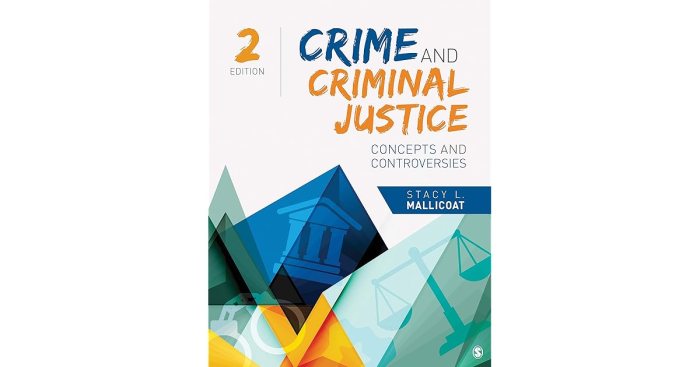Crime and criminal justice concepts and controversies 2nd edition – Introducing the second edition of “Crime and Criminal Justice Concepts and Controversies,” a comprehensive exploration into the intricate world of criminal justice. This updated edition delves into the foundational principles, contemporary issues, and ongoing debates shaping the field, providing a thorough understanding of its complexities.
Through an interdisciplinary lens, this volume examines the criminal justice system’s components, crime classification and etiology, the principles of criminal law, sentencing and corrections, juvenile justice, criminal procedure, victimology, and crime prevention strategies. It analyzes the interplay between theory and practice, highlighting the ethical and legal challenges confronting criminal justice professionals.
1. Criminal Justice System: Crime And Criminal Justice Concepts And Controversies 2nd Edition
The criminal justice system is a complex network of institutions and processes designed to enforce the law, protect the public, and rehabilitate offenders.
The major components of the criminal justice system include:
- Law enforcement agencies (police, sheriff’s departments, etc.)
- Courts
- Correctional facilities (prisons, jails, etc.)
Roles and Responsibilities of Each Component, Crime and criminal justice concepts and controversies 2nd edition
Law enforcement agencies are responsible for investigating crimes, arresting suspects, and preparing cases for prosecution.
Courts are responsible for determining guilt or innocence and imposing sentences.
Correctional facilities are responsible for housing and rehabilitating convicted offenders.
Process from Arrest to Sentencing
The process from arrest to sentencing typically involves the following steps:
- Arrest
- Booking
- Arraignment
- Plea bargaining
- Trial
- Sentencing
2. Crime Concepts

Crime is a violation of the law that can result in criminal penalties.
Types of Crime
Crimes can be classified into two main categories:
- Felonies: Serious crimes that are punishable by imprisonment for more than one year.
- Misdemeanors: Less serious crimes that are punishable by imprisonment for less than one year.
Causes and Consequences of Crime
The causes of crime are complex and varied, but some of the most common factors include:
- Poverty
- Lack of education
- Unemployment
- Mental illness
- Substance abuse
The consequences of crime can be devastating for both individuals and society as a whole.
- Victims of crime may suffer physical, emotional, and financial harm.
- Crime can also lead to social unrest and economic decline.
3. Criminal Law

Criminal law is the body of law that defines crimes and sets out the punishments for those crimes.
Principles of Criminal Law
The principles of criminal law include:
- Due process of law
- Presumption of innocence
- Right to a fair trial
Elements of a Crime
In order to prove that a crime has been committed, the prosecution must prove that the following elements have been met:
- Actus reus: The physical act of committing the crime.
- Mens rea: The mental state of the person committing the crime.
Defenses to Criminal Charges
There are a number of defenses that can be raised to criminal charges, including:
- Self-defense
- Insanity
- Duress
Questions Often Asked
What are the key components of the criminal justice system?
The criminal justice system comprises law enforcement agencies, courts, and correctional facilities, each with distinct roles in apprehending, prosecuting, and rehabilitating individuals accused or convicted of crimes.
How are crimes classified?
Crimes are typically classified based on their severity, ranging from minor offenses to serious felonies. Common classifications include violent crimes, property crimes, and white-collar crimes.
What are the principles of criminal law?
Criminal law establishes the definitions of crimes, their punishments, and the procedures for enforcing them. Key principles include due process, the presumption of innocence, and the right to a fair trial.